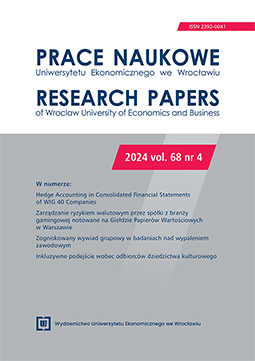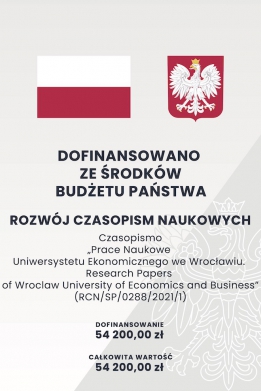Charakter lokalnych strategii marketingu miejsc: Studium przypadków Ałmatów (KZ); Belo Horizonte (BR) i Wrocławia (PL)
DOI:
https://doi.org/10.15611/pn.2024.4.09Słowa kluczowe:
strategia marketingu miejsca, zrównoważony rozwój gospodarczy, Ałmaty, Belo Horizonte, WrocławAbstrakt
Cel: Celem badań była identyfikacja i ocena cech strategii marketingu miejsc trzech miast z różnych części świata, tj.: Ałmaty (Kazachstan), Belo Horizonte (Brazylia) i Wrocław (Polska), jako metod stymulowania zrównoważonego rozwoju gospodarczego.
Metodyka: W badaniach zastosowano metodykę komparatywnego studium przypadków.
Wyniki: Badania wykazały, iż choć wszystkie z badanych strategii marketingu miejsc ukierunkowane są w jakiś sposób na stymulowanie lokalnych procesów gospodarczych to brakuje im cech zapewniających zrównoważenie tych procesów..
Implikacje i rekomendacje: Uzyskane wyniki badań wskazują na znaczące ograniczenia i napięcia w zakresie strategii marketingu miejsc, a przez to motywują do badań reprezentatywnych oraz do poszukiwania bardziej zrównoważonych rozwiązań.
Oryginalność/wartość: Kwerenda literaturowa nie wykazała pierwowzorów przeprowadzonych badań, a zastosowana w nich metodyka miała częściowo autorski charakter. Artykuł dostarcza nowych informacji o strategiach marketingu miejsc stosowanych w różnych krajach i wartościują je w odniesieniu do paradygmatu rozwoju zrównoważonego.
Pobrania
Bibliografia
Amorós, J. E., Ciravegna, L., Mandakovic, V., & Stenholm, P. (2019). Necessity or Opportunity? The Effects of State Fragility and Economic Development on Entrepreneurial Efforts. Entrepreneurship: Theory and Practice, 43(4), 725-750. https://doi.org/10.1177/1042258717736857
Audretsch, D. B., Cunningham, J. A., Kuratko, D. F., Lehmann, E. E., & Menter, M. (2019). Entrepreneurial Ecosystems: Economic, Technological, and Societal Impacts. Journal of Technology Transfer, 44(2), 313-325. https://doi.org/10.1007/s10961-0189690-4
Batten, D. F. (1995). Network Cities: Creative Urban Agglomerations for the 21st Century. Urban Studies, 32(2), 313-327. https://doi.org/10.1080/00420989550013103
Cao, Z., & Shi, X. (2021). A Systematic Literature Review of Entrepreneurial Ecosystems in Advanced and Emerging Economies. Small Business Economics, 57(1). https://doi.org/75-110. 10.1007/s11187-020-00326-y
Cavalheiro, M. B., Joia, L. A., & Cavalheiro, G. M. do C. (2020). Towards a Smart Tourism Destination Development Model: Promoting Environmental, Economic, Socio-cultural and Political Values. Tourism Planning and Development, 17(3), 237-259. https://doi.org/10.1080/21568316.2019.1597763
Duignan, M. B., & Pappalepore, I. (2023). How Do Olympic Cities Strategically Leverage New Urban Tourism? Evidence from Tokyo. Tourism Geographies, 25(2-3), 425-449. https://doi.org/10.1080/14616688.2021.1895296
Edensor, T. (2007). Mundane Mobilities, Performances and Spaces of Tourism. Social and Cultural Geography, 8(2), 199-215. https://doi.org/10.1080/14649360701360089
Edmondson, A. C., & Mcmanus, S. E. (2007). Methodological Fit in Management Field Research. Academy of Management Review, 32(4), 1246-1264. https://doi.org/10.5465/AMR.2007.26586086
Eisenhardt, K. M., & Graebner, M. E. (2007). Theory Building from Cases: Opportunities and Challenges. Academy of Management Journal, 50(1), 25-32. https://doi.org/10.5465/AMJ.2007.24160888
Gast, J., Gundolf, K., & Cesinger, B. (2017). Doing Business in a Green Way: A Systematic Review of the Ecological Sustainability Entrepreneurship Literature and Future Research Directions. Journal of Cleaner Production, 147, 44-56. https://doi.org/10.1016/j.jclepro.2017.01.065
Gimenez, F. A. P. (2022). Reflections on Entrepreneurial Ecosystems, Citizen Collectives and Basic Income. REGEPE – Revista de Empreendedorismo e Gestão de Pequenas Empresas, 11(2), 1-8. https://doi.org/10.14211/ibjesb.e2325
Gioia, D. A., Corley, K. G., & Hamilton, A. L. (2013). Seeking Qualitative Rigor in Inductive Research. Organizational Research Methods, 16(1), 15-31. https://doi.org/10.1177/1094428112452151
Global Entrepreneurship Monitor – GEM. (2023). Global Entrepreneurship Monitor 2022/2023 Global Report: Adapting to a “New Normal”. https://gemconsortium.org/report/20222023-global-entrepreneurship-monitor-global-reportadapting-to-a-new-normal-2
Halme, M., Piekkari, R., Matos, S., Wierenga, M., & Hall, J. (2022). Rigour vs. Reality: Contextualizing Qualitative Research in the Low‐Income Settings in Emerging Markets. British Journal of Management, 35(1), 36-51. https://doi.org/10.1111/1467-8551.12690
Kaneva, N. (2011). Nation Branding: Toward an Agenda for Critical Research. International Journal of Communication, 5, 117-141. https://ijoc.org/index.php/ijoc/article/view/704/514
Kerimray, A., Baimatova, N., Ibragimova, O. P., Bukenov, B., Kenessov, B., Plotitsyn, P., & Karaca, F. (2020). Assessing Air Quality Changes in Large Cities during COVID-19 Lockdowns: The Impacts of Traffic-Free Urban Conditions in Almaty, Kazakhstan. Science of The Total Environment, 139179(730), 1-8. https://doi.org/10.1016/j.scitotenv.2020.139179
Klopp, J. M., & Petretta, D. L. (2017). The Urban Sustainable Development Goal: Indicators, Complexity and the Politics of Measuring Cities. Cities, 63, 92-97. https://doi.org/10.1016/j.cities.2016.12.019
Krishnan, A. M. (2016). Entrepreneurship and the Discovery and Exploitation of Business Opportunities: Empirical Evidence from the Malawian Tourism Sector. In M. M. Mariani, W. Czakon, D. Buhalis, & O. Vitouladiti (Eds.), Tourism Management, Marketing, and Development: Performance, Strategies, and Sustainability. Palgrave Macmillan. https://doi.org/10.1057/9781137401854_4
Muñoz, P., & Cohen, B. (2018). Sustainable Entrepreneurship Research: Taking Stock and Looking Ahead. Business Strategy and the Environment, 27(3), 300-322. https://doi.org/10.1002/bse.2000
Njoroge, M., Anderson, W., Mossberg, L., & Mbura, O. (2020). Entrepreneurial Orientation in the Hospitality Industry: Evidence from Tanzania. Journal of Entrepreneurship in Emerging Economies, 12(4), 523-543. https://doi.org/10.1108/JEEE-11-20180122
Ogonowska, M., & Torre, D. (2016). Towards Sustainable Tourism. In M. M. Mariani, W. Czakon, D. Buhalis, & O. Vitouladiti (Eds.), Tourism Management, Marketing, and Development: Performance, Strategies, and Sustainability. Palgrave Macmillan. https://doi.org/10.1057/9781137401854_10
Pflieger, G., & Rozenblat, C. (2010). Introduction. Urban Networks and Network Theory: The City as the Connector of Multiple Networks. Urban Studies, 47(13), 2723-2735. https://doi.org/10.1177/0042098010377368
Pumain, D. (2021). From Network of Cities to Systems of Cities, In C. Rozenblat & Z. Neal (Eds.) Handbook of Cities and Networks, (pp. 16-40). Edward Elgar Publisher. https://doi.org/10.4337/9781788114714.00007
Rodríguez-Pose, A., & Wilkie, C. (2017). Revamping Local and Regional Development Through Place-Based Strategies. Cityscape, 19(1), 151-170. https://www.jstor.org/stable/26328304
Różycka-Czas, R., Czesak, B., & Staszel, A. (2021). Which Polish Cities Sprawl the Most. Land, 10(12), 1291, 1-18. https://doi.org/10.3390/land10121291
Sharpley, R., (2015). Tourism: A Vehicle for Development? In R. Sharpley & D. J. Telfer (Eds.) Tourism and Development: Concepts and Issues, (pp. 3-30). Channel View Publications. https://doi.org/10.21832/9781845414740-003
Sztando, A. (2017). Local Culture in Supra-local Perspective of Local Development Strategic Governance of Polish Small Towns. Studia Ekonomiczne, 314, 61-79. https://cejsh.icm.edu.pl/cejsh/element/bwmeta1.element.cejsh-a4dc14c2-c7e4-4373a1aa-b53803c90b67
Tammpuu, P., & Masso, A. (2018). ‘Welcome to the Virtual State’: Estonian E-residency and the Digitalized State as a Commodity. European Journal of Cultural Studies, 21(5), 543-560. https://doi.org/10.1177/1367549417751148
United Nations. (2015). Transforming Our World: The 2030 Agenda for Sustainable Development. United Nations. https://sustainabledevelopment.un.org/content/documents/21252030%20Agenda%20for%20Sustainable%20Develop ment%20web.pdf
United Nations. (2022). The Sustainable Development Goals Report 2022. United Nations. https://unstats.un.org/sdgs/report/2022/
Van Ham, P. (2008). Place Branding: The State of the Art. Annals of the American Academy of Political Science, 616(1), 126-149. https://doi.org/10.1177/0002716207312274
World Health Organization(2018). Millennium Development Goals (MDGs). World Health Organization. https://www.who.int/news-room/fact-sheets/detail/millennium-development-goals-(mdgs)
World Tourism Organization (2020). Recommendations on Urban Tourism. UNWTO Recommendations on Urban Tourism.
World Tourism Organization (UNWTO). https://doi.org/10.18111/9789284422012
Wurth, B., Stam, E., & Spigel, B. (2022). Toward an Entrepreneurial Ecosystem Research Program. Entrepreneurship Theory and Practice, 46(3), 729-778. https://doi.org/10.1177/1042258721998948
Yusupova, G., & Pfoser, A. (2023) Tourism, Memory Production and Contested Ethnic Hierarchies in Post-Soviet Almaty. Europe-Asia Studies, 75(3), 491-508. https://doi.org/10.1080/09668136.2021.1964437
Pobrania
Opublikowane
Numer
Dział
Kategorie
Licencja
Prawa autorskie (c) 2024 Andrzej Sztando, João Paulo Moreira Silva, Aizhan Kazybayeva

Utwór dostępny jest na licencji Creative Commons Uznanie autorstwa – Na tych samych warunkach 4.0 Miedzynarodowe.
Accepted 2024-09-16
Published 2024-12-17









